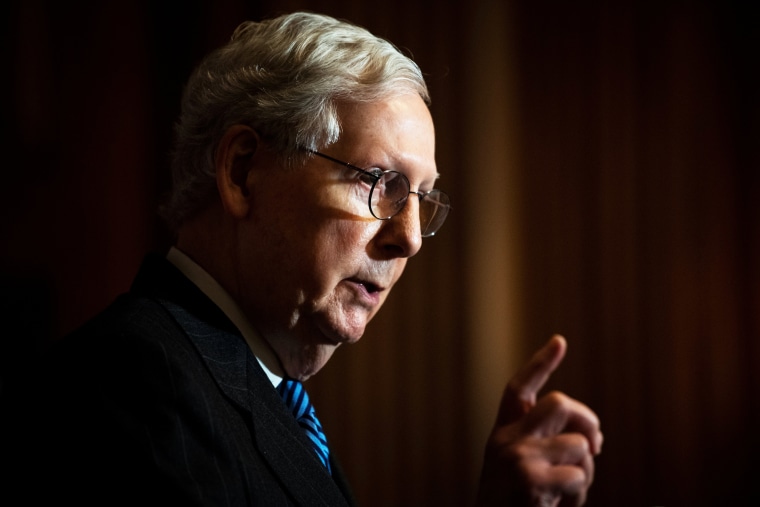To help pay for new infrastructure investments, President Joe Biden is sticking to the blueprint he presented to voters during the 2020 campaign: he intends to roll back parts of the Republicans' 2017 package of tax breaks for wealthy and big corporations. It's an approach that makes fiscal sense and enjoys fairly broad public support.
It's also an approach that Senate Minority Leader Mitch McConnell (R-Ky.) took off the negotiating table this morning.
McConnell warned on Monday that it was a non-starter, saying that Republicans "are not going to revisit the 2017 tax bill," which the Senate GOP leader called the "most significant domestic accomplishment" from the Trump-era other than judicial nominations. Republicans, as part of the 2017 bill, lowered the corporate tax rate to 21 percent. "We're not willing to pay for it by undoing the 2017 bill," McConnell said.
The Kentucky Republican also said this morning that he and his party are "open to doing a roughly $600 billion" infrastructure package, adding that GOP senators are willing to "talk about how to pay for that in any way other than reopening the 2017 tax reform bill."
It's worth taking a moment to unpack this, because it's likely to have a dramatic effect on the larger legislative fight.
McConnell's position, which presumably represents his party's consensus, is relatively straightforward: Biden can have a bipartisan deal with a $600 billion infrastructure plan that leaves the Trump-era tax breaks intact. This comes just a few weeks after Sen. Shelley Moore Capito (R-W.Va.) described the GOP's tax cuts from four years ago as a "non-negotiable red line."
What's wrong with this? Pretty much everything.
First, $600 billion for infrastructure investments is obviously inadequate. Remember, Capito recently told CNBC that a package between $600 billion and $800 billion would be in a "sweet spot" for a larger compromise. Despite the White House's $2 trillion blueprint, the Senate GOP leadership, at least on the surface, is now eyeing the lowest end of that range, which hardly seems designed to advance the negotiations.
Second, the $600 billion proposal isn't really a $600 billion proposal. What Senate Republicans actually put forward is a $568 billion plan, and as Catherine Rampell explained last week, "[I]n reality, Republicans are offering nothing remotely close to a serious or reasonable counter-bid, and they know it. This is obvious from their use of an accounting gimmick that inflates their 'compromise' and makes it look more similar in size to Biden's plan."
The budget games get a little complicated -- it's all about playing with baselines -- but a separate Washington Post analysis explained, "[T]he Senate GOP would propose spending an additional $189 billion."
Third, while McConnell described the 2017 tax breaks as the "most significant domestic accomplishment" from the Trump-era, and Republicans increasingly look at the package as untouchable, the inescapable reality is that the GOP tax cuts failed at each of the party's stated goals. In other words, Republicans are refusing to consider any changes to a policy that demonstrably failed.
And finally, the more McConnell & Co. play these games, the more likely it is that Democrats will feel as if they have no choice but to pass their own bill through the budget reconciliation process, leaving Republicans behind.
As we've discussed, Democrats such as West Virginia's Joe Manchin don't want that to happen, but Congress' most conservative Democrat also recently said that Republicans aren't approaching the debate in a "reasonable" way.
This morning, McConnell effectively conceded that being "reasonable" simply isn't part of the GOP's gameplan.

